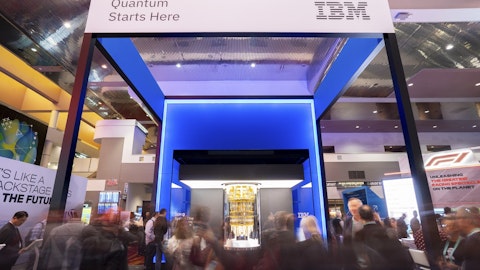So national labs, university researchers and those kinds of organizations who have significant interest in getting an on-premise quantum computer. There’s a lot of value in doing that. We can do hands-on research, we can get first-hand experience with how do you do — not only computations with quantum computing, but also how do you optimize, how you do algorithm developments and so on. So, there are many reasons why customers are interested in getting a quantum computer on-premise. The way we have enabled a 9-qubit quantum computer. It’s a simple module that essentially gets plugged into an existing dilution refrigerator. And many national labs and university researchers have already purchased a dilution refrigerator. So, for them, it’s a relatively straightforward change to take off some components and put in our quantum computer and they can be up and running fairly quickly.
So, it’s a relatively simple process to get somebody enabled with a quantum computer and get them hands on experience. And that’s what we are focused on right now. Besides the technology development part, of course.
Unidentified Analyst: Okay, perfect. Just the last question, if I could, wanted to ask about your quantum cloud service. So, I know it’s still very early innings for your QCS business. I guess in terms of non-government cloud service revenues. It’s still, I think, just given your strategic shifts in focus to the fidelity rates and all the progress you’ve made, so far this year, I guess have you sensed any noticeable shift in commercial interest in using your QCS services, either from direct feedback from customers or maybe any indications from your ecosystem partners that you work with to deliver a QCS?
Subodh Kulkarni: So, sure for Quantum service through the cloud, we obviously have relationship with AWS, Azure as well as our own cloud, and also our focus on quantum computer to select government organizations. Commercial interest is definitely there, but still relatively low compared to national labs and university researchers. And most likely it is because we are still away from quantum advantage. As we approach that quantum advantage in the next two to three years, we definitely expect commercial interest to so — and that’s where the potential explosive growth opportunity comes in, in two or three years from now. But as of today, most of the usage is on researchers, and national labs and university researchers to dominate the usage of quantum computing today.
Unidentified Analyst: Great, thank you so much. And nice job on the quarter.
Subodh Kulkarni: Thank you, Steven.
Operator: Our next question comes from David Williams with the Benchmark Company. Your line is open.
David Williams: Hey, good afternoon, and thanks for taking my question. Forgive me if this was asked or answered already, I’m a little late joining here. But just one of the things Subodh if you could talk a little bit about the QPU sale you had previously — I know you mentioned another one that you can’t disclose. But just I guess if you could talk maybe about the inbound activity and anything you’re seeing there that gives you optimism of additional sales in future. Thank you.
Subodh Kulkarni: So, sure. Thanks, David. So, we sold our first QPU in Q2. And as I mentioned earlier, as far as we know, that is the first time any company has sold a quantum computer to a customer. And that was to SCMS centric formula that happened in Q2 of this year. We sold another QPU in Q3 of this year, we’ll do another premier national lab, it will hopefully be able to disclose the name soon. Pipeline for future QPU sales continues to build, we are talking to more than a dozen customers right now. Most of them are for 9-qubits, some have expressed interest in 24-qubit. And one has expressed interest in even 84-qubit. Certainly, the price point continues — goes up dramatically when you go from 9-qubit to 24-qubit. Overall we are very pleased with the reaction we are getting for QPU, optimized QPU specifically.



